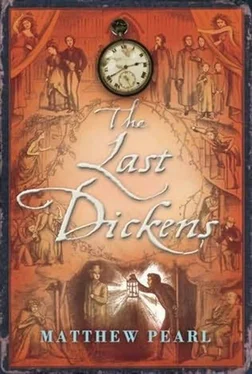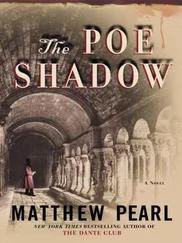“If people believed Trood was alive,” said Rebecca, “your organization could collapse, be overtaken by doubts, because of your lie that started it. People began to believe that the supposedly murdered Trood was alive and knew your secrets.”
Wakefield waved his hand in the air. “You see, Mr. Osgood, your bookkeeper is a natural woman of business. Yes, it's true. If it was believed that Eddie Trood had not died, it meant he could be out there somewhere waiting to use his knowledge to bring us down. Yet that is not all that has haunted me since Dickens picked up his pen to retell my story. After the case of Webster and Parkman of your city became famous, the methods it also made famous spread. The skeleton of Parkman was identified by his teeth. Since then, death does not bring an end to all things. And if the police were to hear the tales that Trood might be alive and decide to dig up the grave of Edward Trood? Would they determine it was not Trood, and then what? If that was not Trood lying beneath the earth, where was he? You can imagine the entertainment Scotland Yard would have with that question. You can imagine how free I would be to move about London-my old self suddenly resurrected! Arthur Grunwald convinced the Surrey to perform just such an ending in their production of Mr. Dickens's book, so Herman burned it down early on the morning of our departure. A shame, though, that Grunwald had to be in the green room, I did enjoy him as Hamlet at the Princess. You see, even Herman and myself are not always perfect.
“Of course, I read Tom Branagan's wire when we made port at Queenstown. The captain directed it toward me upon my instructions before you saw it. What a dear soul your Constable Tom is, to find proof that the letter to Forster was Grunwald's forgery. That letter would have been a great interference to us.”
“These six installments,” Osgood said, gripping the satchel with the remainder of Dickens's novel tightly. “That's all you want, then, to destroy these?” Osgood folded his satchel into his chest.
Wakefield laughed. “If only there were happy music,” he mused suddenly. “Yes, that would put all our minds at ease. What do you say, Ironhead Herman?” Wakefield extended his hand and Herman took it, being swept around the room, dancing a brisk waltz around Osgood and Rebecca. “Are we graceful enough for you, Osgood?” Wakefield asked, laughing and bowing.
It was a chilling scene to watch the two killers waltz across the warehouse. Strangest in the tableau was this: Ironhead Herman was ready to look like a fool on command of Wakefield. If Herman were a killer who respected only brutality and force, what were the depths of Wakefield's own brutality to have that kind of hold over him? The meaning of it sunk into Osgood. The dance, step by step, made one thing clear as noontime. They would die there.
“Please, for mercy's sake, let Miss Sand go free,” Osgood said prayerfully.
Wakefield examined his captives, saying, “I am not the terrible man you must now imagine. My curse in life is to have the vision others do not. I can understand what your government and mine still cannot. People are beginning to make a devil out of opium and opium use; in their minds the opium eater is as unreal and unwanted as a human vampire. They have protested the morality of the trade with China. Before long the Americans and the English will hold opium accountable for all their own faults and pass more rules and regulations. China has finally surrendered their will against the drug and will grow the poppy themselves to feed their people's appetite. Besides, with the opening of the Suez Canal, every damned little parleyvou with a tugboat can get to China without any skills or knowledge of trading: the coasts will be positively overrun. It is your own people who clamor for supply, with scores of soldiers-Yankee and Rebel alike-returned to their homes under the spell of injury and the need for relief and ignored by a society that has moved on with commerce and progress while those brave souls wither. Now with the hypodermic, any man or woman who wishes will provide themselves with the medication and enjoyment they can no longer find in the devouring cities without artificial assistance. America is the land of experimentation-a new religion, a new medicine, a new invention-if there is something to transform, Americans will throw away all constraints with the freedom of self-indulgence. Alcohol makes man into beast, but opium makes him divine. The syringe will replace the flask and be an unfailing remedy in the pocket of the businessman, the bookkeeper, the mother, the teacher, and the lawyer who suffer the curse of modern cares. What do you think of it, Osgood? Oh, I know your trade is books, but it all comes down to this: to know your customers, to know how they wish to make their escapes from this bleak world, and to make sure they can't live without you. The modern brain will wither without finding a way to join excitement and numbness. We have sought the same thing through Dickens, you and I, to protect ourselves and the people we depend on. No, I seek nobody's death.”
“Daniel Sand depended on me,” Osgood said, “and I could not protect him.”
“But I could have,” Wakefield said, “if he had not been so set on your approval.” He turned solicitously to Rebecca. “My dear girl, I'm afraid you've gained too much intelligence today to live freely without causing me some degree of future consternation. You have fascinated me from the moment I saw you. We have both been made invisible by unjust forces. Damn the rules of your divorce, damn the little position Osgood has thrown at you for half pay, the peasant laborer he made your brother into: come with me back to England, you will have all you ever ask for, all you deserve. That is why I have unfolded every-thing for you now. I'd want you to understand all the reasons for what has happened, so that you could consider my offer honestly once and for all within your heart.”
Rebecca looked up from where she sat, first at Osgood, then at Wakefield. “You killed Daniel! You are nothing but a scoundrel and a liar! A woman could have loved Eddie Trood, with all his faults in the face of a hard world, but never a fraud like you!”
Wakefield's face turned red before his hand went flying out across her face. To his apparent surprise, she did not cry when he struck her. “I shall not give you the satisfaction, Mr. Trood,” she said bitterly, seeing in his raging eyes his anticipation. “I'll weep for my brother, not for anything you could do to me.”
“Ungrateful female,” Wakefield said, turning away from her and replacing his hat on his head. “You have done fine in training her in your species of high-handed failure, Mr. Osgood. Very well. You have made your bed, Rebecca; now you may both lie in it.”
Wakefield turned his back to them.
“Your father!” Osgood said.
Wakefield slowed his steps.
“Your father misses you, Edward,” Osgood continued.
Wakefield sighed longingly. Then, as he turned around again he laughed, harshly this time.
“Thank you. I shall have to see to it that my old man never tells another soul my story who may pick up on the clues as you have done. We'll be paying him a visit back in England, be sure, and Jack Chinaman, and your friend Branagan, too.”
Wakefield disappeared up the stairway
Herman stood grinning toothlessly and raised his walking stick. He swung it at Osgood's satchel, scattering the floor with the pages of the final six installments of Edwin Drood.

PLEASE, HORMAZD, WE CAN WORK OUT A BARGAIN,” SAID OS-good pleadingly to Herman.
“This isn't a Jews’ marketplace,” replied Herman, momentarily pausing at his given name. “No bargains.” He seemed to contemplate the beastly animal head on his walking stick for a moment. Then he glowered at his prisoners. “The only thing I'd regret, Osgood, is that Mr. Wakefield insisted on trying to persuade her to come with us. Waiting makes me angry. I may even finish you off with my bare hands.”
Читать дальше













